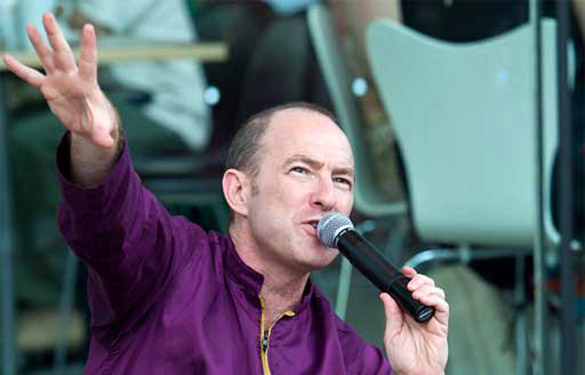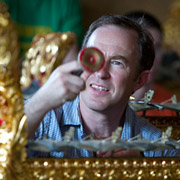Opera News calls Ziporyn's new opera "colossally imaginative"

"Ziporyn's West-meets-East adventure
is a grand kaleidoscopic success that
no one else could have dreamed up."
— Opera News
Review from Opera News
A Publication of the Metropolitan Opera Guild
Brooklyn Academy of Music
14 October 2010
Listening
"Listen to it! The confusion of sounds, jangled dissonance, merging to form constantly surprising harmonies in this absolute music."
Those words, sung by Colin McPhee, the protagonist of Evan Ziporyn's colossally imaginative new opera, "A House in Bali," constitute a pretty good stab at a description of the opera itself. McPhee (1900–1964), on whose memoirs "A House in Bali" is based, was a Canadian composer most famous for his on-location study of the Balinese gamelan, and for his efforts to bring this music to the West.
A multimedia phantasmagoria
Ziporyn, who teaches music at MIT, became similarly transfixed by the sound of the gamelan after hearing a recording of Balinese music in 1979; he made his own pilgrimage to Bali shortly thereafter, with many more to follow. The new opera, which received three performances at the Howard Gilman Opera House as part of the BAM Next Wave Festival (seen Oct. 14), is Ziporyn's homage to McPhee, as well as a multimedia phantasmagoria of Eastern and Western music, video, dance and performance art.
Ziporyn's forces for the work include the sixteen-member native Balinese group Gamelan Salukat; seven members of the Bang on a Can All-Stars; three singers; four dancers; and a roving videographer feeding images in real time to one of two screens sitting atop the action. Emerging as the musical and conceptual crux of the work, however — and the evening's brilliant highlight — is the juxtaposition and intermingling of the Western and Eastern musical forces.
A breathaking cultural transition moment
The opera begins in France, where McPhee finds himself disaffected with Parisian life in general and the contemporary concert scene in particular. The driving, syncopated music is played by the amplified instrumentalists of the Bang on a Can group — strings, piano, guitar and percussion — in the edgy and appealing rock-n-roll-meets-contemporary-classical vein made famous by Bang on a Can and other downtowners. When McPhee decides he needs to return to Bali, the gamelan kicks in, with its clangorous, pulsating drums, gongs and metal keyboards, transforming the melodic material of the previous section with dazzling intricacy and providing a breathtaking cultural transition moment that defines the whole evening.
Once Kesyur, McPhee's friend and Balinese-speaking guide, starts showing McPhee around, the two ensembles begin playing together and in alternation. We're treated to lyrical vocal melodies for McPhee, with giddy, clamorous interruptions from the gamelan. Both bands together make for marvelously organized cacophony, with the partially dissonant, electronic rocking of the West and the relentless, mind-bogglingly complex thrumming and pealing of the East. It captures the craziness of what it must have been like for McPhee to be 10,000 miles from home.


"Evan's work challenges the listener to rethink traditional categories
of sound and apprehension, and inspires us to expand our
understanding of what music can do in our hearts and heads."
Deborah Fitzgerald, Kenan Sahin Dean,
MIT School of Humanities, Arts, and Social Sciences
Penetrating beauty
Amid the exuberant onslaught, tenor Peter Tantsits sang the role of McPhee with vibrant, penetrating beauty, managing the complexities of his role with complete mastery and infallibly good diction. His fellow cast members were similarly impressive: the clarion-voiced soprano Anne Harley brought good humor and amiable self-satisfaction to the role of anthropologist Margaret Mead, whose melodic figures are especially ingratiating. As the German painter Walter Spies, Timur Bekbosunov displayed a pleasing vocal coloring similar to that of Tantsits, and came across as likeably hedonistic — much more at home in his surroundings than McPhee (Spies settled permanently in Bali in 1927.) One of the scenes builds into an unexpectedly lyrical, lilting trio for the three principals — a musical highlight. For all his anti-establishment tendencies and multi-stylistic mayhem, Ziporyn writes idiomatically for the voice.
Two female dancers, Kadek Dewi Aryani and Desak Madé Suarti Laksmi, performed with hypnotic grace throughout. (Aryani was also co-choreographer, along with Nyoman Catra, who played the comic wheeler-dealer Kesyur and other-supporting roles.) Laksmi did an intense turn as a Kekawin singer who wails of impending doom. The young dancer Nyoman Triyana Usadhi played Sampih, the Balinese youth with whom McPhee becomes infatuated. In one wonderful sequence, Sampih studies dance with a patient girl from Bedulu (Aryani), and Usadhi reveals increasing virtuosity before our eyes, like a Balinese Billy Elliot. Director Jay Scheib's grandly imaginative conception is daunting and busy, to be sure, but constitutes an inherent part of the evening's fascination.
The house of the "other"
The ending is a bit of a downer: "The house of the other cannot be entered lightly," intones Harley as Mead, while the ensemble dismantles McPhee's home, Spies is led away by a policeman and we watch the pantomimed death of Sampih. McPhee may ultimately remain an outsider, but Ziporyn's West-meets-East adventure is a grand kaleidoscopic success that no one else could have dreamed up."
— JOSHUA ROSENBLUM
Feature story: Ziporyn embarks on a season of major musical events